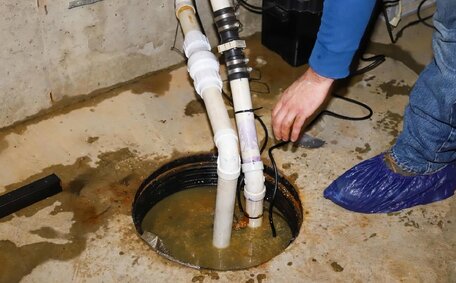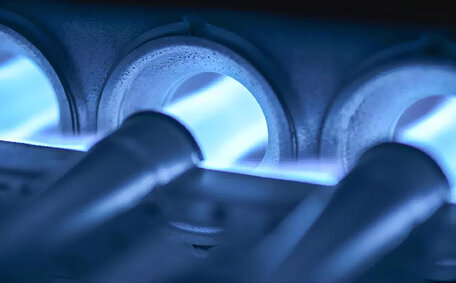What are the signs of a gas leak?
Detecting a potential gas leak early is crucial for safety. Some telltale signs of a gas leak around your home include:
- A distinct “rotten egg” odour, which is added to natural gas to help identify leaks
- Hissing, whistling or roaring sounds coming from gas appliances or pipes
- Dirt or dust blowing from a pipe
- Bubbles in standing water over a gas line
- Dead vegetation or discoloured soil near gas lines
- Pilot lights that repeatedly go out
- Unusually high gas bills
- Flames coming from appliances that are yellow or orange instead of blue
- Feeling light-headed, dizzy or experiencing nausea when near gas appliances
While any of these signs warrant caution, the characteristic rotten egg smell is the most telltale indicator of a gas leak. Never ignore it. If you suspect a leak, immediately evacuate the area, call your gas company or emergency services, and take steps to improve ventilation around the site of the leak until help arrives.
A rotten egg smell
Natural gas is actually odourless in its pure form. This makes gas leaks quickly detectable if the added odorant is present.
Gas companies add a chemical called ethyl mercaptan to give it a distinct “rotten egg” smell. Ethyl mercaptan has an extremely low odour threshold, so even small leaks can make the smell noticeable. If you detect this pungent rotten egg odour inside or around your home, it likely signals a gas leak. Don’t brush it off - take immediate action to identify the source, ventilate the area, and contact your gas company or emergency services.
Hissing or whistling sounds
Listen closely for any hissing or whistling noises near gas appliances like your stove, water heater or furnace. Gas escaping from pipes, valves or fittings can create high-pitched hissing or whistling noises as it passes through small openings under pressure. Turn off individual gas appliances one by one to isolate the source of the sound. If it stops when you turn off the gas to a particular appliance, that indicates where the leak is occurring.
This could signal a dangerous leak. The sound may be faint, but it’s important to investigate.
Also listen near the gas metre and along gas lines running into your home. Leaks in underground pipes outside can allow gas to enter your home and make hissing noises inside. Don’t dismiss strange sounds just because you can’t pinpoint the exact location. They can use special leak detection equipment to thoroughly check for the presence of gas.
If you hear hissing or whistling anywhere inside your home, play it safe and call your gas company or emergency services.
Physical symptoms
Exposure to leaking natural gas can potentially cause adverse health effects. Natural gas is mostly methane, which displaces oxygen. And methane itself is harmless, but natural gas also contains trace amounts of other gases and chemicals that can be hazardous.
One such compound is carbon monoxide – an odourless, invisible gas that can be deadly. One such compound is carbon monoxide – an odourless, invisible gas that can be deadly. Exposure causes flu-like symptoms such as headaches, dizziness, fatigue, nausea, and confusion – effects often mistaken for common illnesses. In high concentrations, carbon monoxide can be fatal within minutes.
each year.
Mercaptans used to give natural gas its smell are also toxic in high doses and can irritate the eyes, skin and lungs. Symptoms like nausea, vomiting and breathing difficulties are signs of overexposure.
Bottom line – never ignore warning signs like odours or noises that might indicate a leak. Headaches, lightheadedness or nausea while around gas appliances could signal a dangerous exposure. Immediately get to fresh air and call for help.
Higher gas bills
An abnormally high gas bill can be one of the first indicators of a leak on your property. While rates and usage do fluctuate seasonally, a spike that is significantly above your average bill demands further investigation.
Start by ensuring billing errors are not to blame, and cross-reference usage with periods where you were away from home. If usage still seems excessive, a leak may be slowly releasing gas. Even small leaks over time can result in surprisingly large volumes of wasted gas.
Here’s how it happens - the smallest leak on a half-inch gas line under 10psi of pressure can lose around 3 cubic feet per hour. Over just one month, that modest leak would waste over 2,000 cubic feet of gas - enough to noticeably inflate your bill.
Don’t ignore persistently high gas bills, as they could indicate a hidden underlying leak. Call in professionals to thoroughly inspect your gas lines using leak detection equipment. They can pinpoint the exact location of any leaks and make necessary repairs.
Left unaddressed, leaks tend to worsen over time and become more costly. But with prompt leak detection, you can prevent inflated bills, wasted gas and dangerous gas buildups inside your home.
Use a gas leak detector
Using a gas leak detector is one of the best ways to accurately pinpoint any leaks on your gas lines. These specialised tools are designed to detect methane or combustible gases in the air.
Gas leak detectors have sensors that alert you to the presence of gas. Gas leak detectors have sensors that alert you to the presence of gas.
As you move the detector around an area, the intensity of audible beeps and indicator lights tells you if you’re getting closer or farther from the source of a leak.
For household use, simple but reliable gas leak detectors are readily available at hardware stores or online. Look for models certified for gas leak detection purposes by organisations like UL or CSA. Follow instructions to calibrate and zero your detector before use.
Move methodically around appliances, gas connections and pipes (indoors and out), holding the probe tip close to surfaces. Any spike in the detector’s alarm indicates potential gas, so mark and investigate those spots further. Confirm leaks with soapy water applied to suspect areas.
Gas leak detectors cannot definitively prove the absence of a leak, so also watch for other signs like odours or pipe damage. But used properly, detectors can reliably pinpoint the location of leaks - just make sure batteries are fresh and calibration is current.
Conduct a soapy water test
One simple method to check for small gas leaks is to apply soapy water to potential problem areas. This low-tech leak detection technique can help pinpoint issues before they become serious.
Mix a couple tablespoons of liquid dish or hand soap into a spray bottle filled with water. Spray or brush the soapy solution directly onto any pipe joints, valves, fittings, or sections showing corrosion. The soapy water can help bubbles form at the site of a leak.
Focus on areas that connect and regulate gas flow - like behind the stove, water heater, furnace, or fireplace. Slowly spray or coat fittings one by one, watching intently for any tiny bubbles emerging. The presence of growing bubbles indicates potential leaking gas.
Mark any leaking spots for further inspection. It’s most effective for small, new, or surface-level leaks.
Turn off gas appliances and the main gas line until a professional can fully assess. While not definitive, a soapy water check can sometimes help detect minor leaks missed by other methods.
However, the absence of bubbles does not guarantee there is no leak. Not all leaks readily produce bubbles with this method. Soapy water should not replace other leak checks, but can serve as a helpful additional visual test when used carefully and deliberately.
What to do if you detect a gas leak
If you suspect a gas leak in or around your home, immediate action is crucial for safety. Follow these steps:
- Evacuate all occupants from the building, leaving doors open as you exit. Get to fresh air right away.
- Avoid sources of ignition like light switches, electronics or phones. Do not smoke.
- Shut off the main gas supply valve on your property, and turn off individual gas appliances at their valves.
- Open windows and doors to ventilate the area.
- Call your gas company’s emergency line, 000, or your local fire department from outside the home. Emphasise it is a potential gas leak so they can despatch crews immediately.
- Do not re-enter the building until the gas company determines it is safe to do so.
Gas leaks left unchecked can cause explosions, fires, carbon monoxide poisoning and other serious dangers. So if you suspect gas, evacuate and call for help right away - never assume it is a small matter.
With prompt reporting and mitigation, potential disasters can be averted. Do not delay in responding appropriately.
How to prevent gas leaks
Preventing hazardous gas leaks starts with proper installation and regular maintenance of your gas lines and appliances. Here are some tips:
- Have gas appliances installed and serviced by licenced technicians. Improper installation is a major cause of leaks.
- Inspect visible gas lines periodically for corrosion and damage. Look for paint bubbling or discoloured vegetation which can indicate underground leaks.
- Clean stove drip pans regularly so spillages don’t obstruct burner ignition.
- Replace old or faulty appliances, pipes and fittings. Age and wear increase leakage risk.
- Keep the area around gas metres clear for easy leak inspections.
- Never store flammable products like gasoline near gas appliances or metre.
- Schedule annual inspections by qualified technicians to check for leaks.
- Install carbon monoxide detectors for extra safety.
Following manufacturer operating and maintenance instructions can also help avoid problems. If in doubt about your gas system’s safety, contact licenced professionals like Paddington Plumbing. Our team has the expertise to inspect your entire gas installation and make any necessary repairs or upgrades to prevent dangerous leaks.






